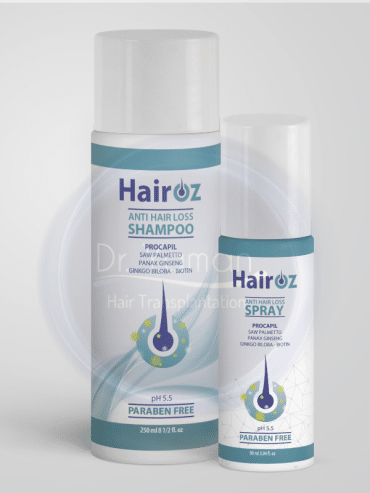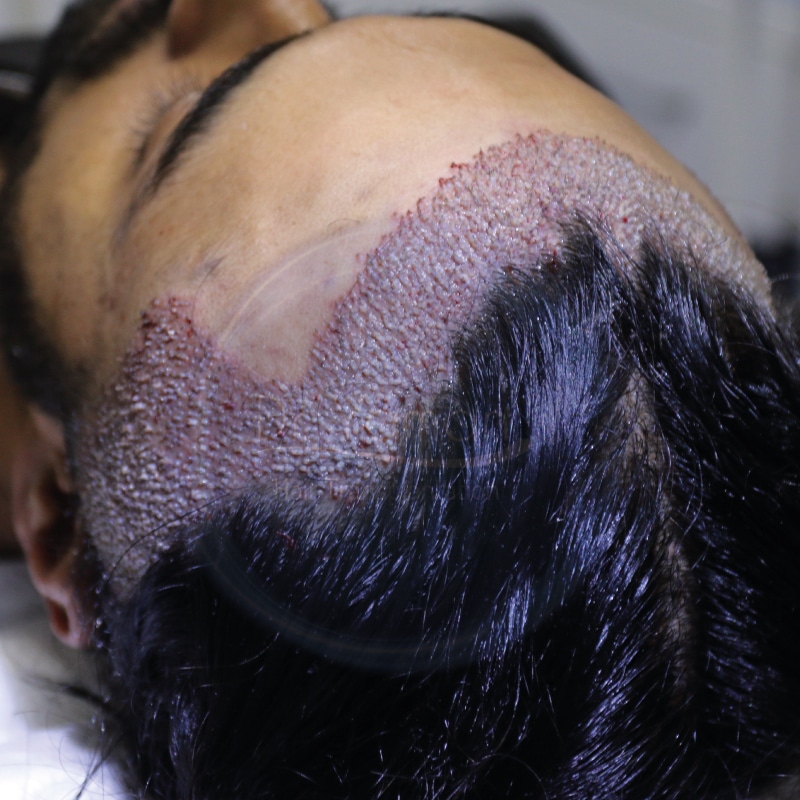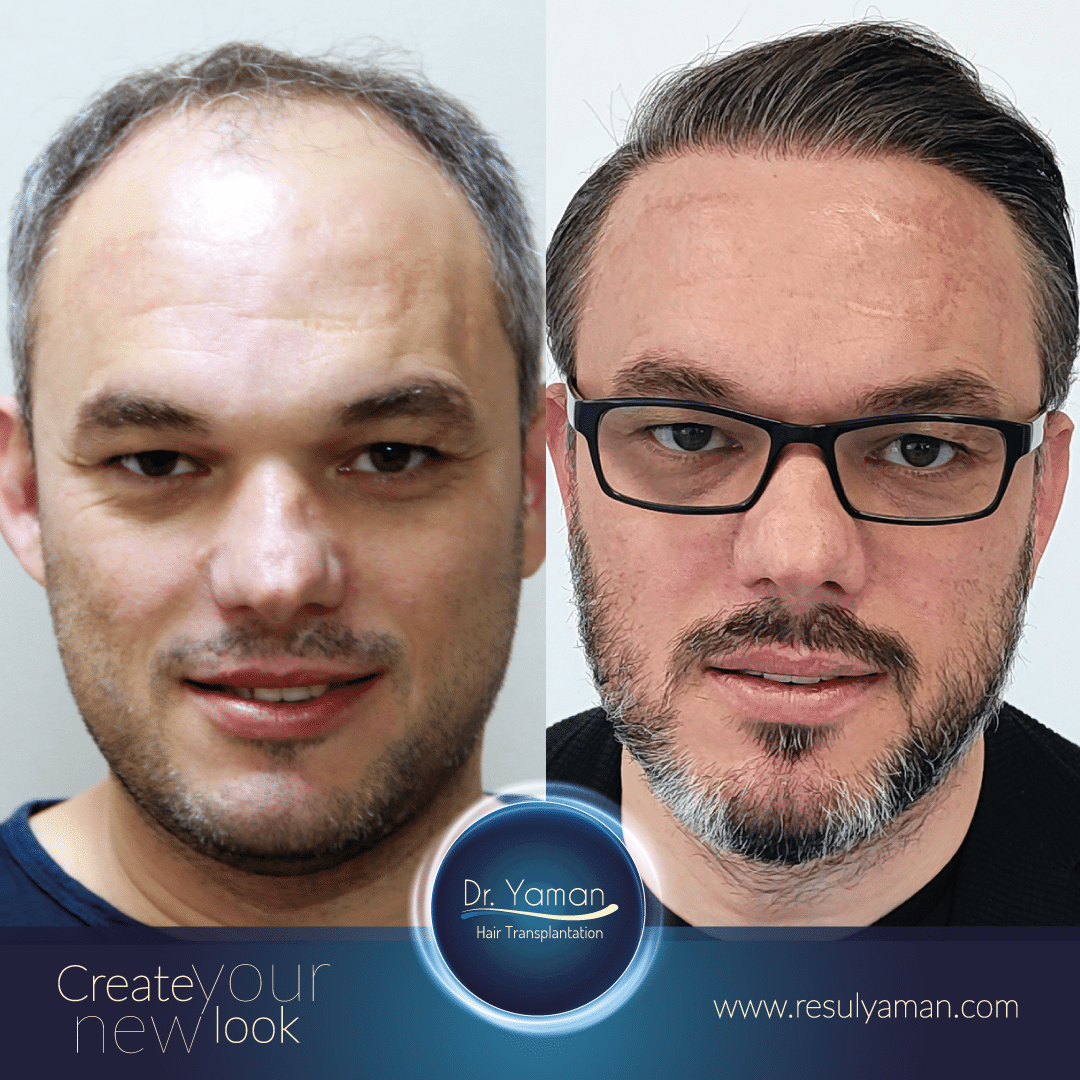Farklı saç dökülmesi türlerini, bunlara neyin sebep olduğunu ve bunları nasıl tedavi edebileceğinizi keşfetmeden önce, ilk etapta saç dökülmesine neyin sebep olduğuna bir göz atalım.
Genetik faktörlerden yaralanmalara, hastalıklardan belirli ilaç türlerine kadar saç dökülmesine neden olabilecek pek çok farklı neden vardır. Saç dökülmesine neyin sebep olduğuna bağlı olarak çözüm, alışkanlıklarınızı değiştirmek kadar basit olabilir. Diğer durumlarda saç dökülmesini gidermek için tıbbi tedavi görmeniz gerekecektir. Eğer bir miktar saç dökülmesi fark ediyorsanız, günde yaklaşık 50 tel saç dökülmesinin normal olduğunu bilin. Yani zayıf saç tellerinizin dökülmesi gerekir ki onların yerine yeni, daha güçlü saç telleri geçebilsin. Bununla birlikte, şiddetli saç dökülmesi yaşıyorsanız ve bunun normal olmadığını düşünüyorsanız, size bu konuda tavsiyelerde bulunabilecek Dr. Resul Yaman ile görüşmeniz gerekir.
40 yaşından sonra saç dökülmesinin yaşanması tamamen normaldir. Yaşlandıkça saçlarınız daha çok dökülmeye başlayacaktır. Ancak yaş, önemli miktarda saç dökülmesine neden olmaz; peki bunun sorumlusu yaş değilse nedir? Aşağıdaki bölümde en yaygın saç dökülmesi türlerini ve bunlara neyin sebep olduğunu inceleyeceğiz. Umarım bunlardan en az biriyle ilişki kurabilecek ve sizin durumunuzda neden saç dökülmesi yaşadığınızı bilebileceksiniz. Bu tür saç dökülmesi saçlarınızın incelmeye başlamasına neden olur. Beslenme bozuklukları ve seks hormonlarındaki dengesizliklerin bir sonucu olabilir. Anemi ve tiroid bozuklukları gibi bazı hastalıklar da telogen effluviumdan muzdarip olmanın nedeni olabilir. Diğer nedenler yaralanmalar, hamilelik, genetik faktörler ve beta blokerler gibi hormonal ilaçların kullanımı olabilir.
Erkek tipi saç dökülmesine androgenetik alopesi denir. Bazı erkekler bu durumdan erken yaşta muzdarip olur ve bunun sonucunda saçları dökülmeye başlar. Tüm bunları göz önünde bulundurduğumuzda androgenetik alopesi de kadınlarda saç dökülmesinin yaygın bir nedenidir.
Bölgesel saç dökülmesinin en yaygın nedenlerinden biri alopesi Areata’dır. Alopesi Areata’dan etkilendiğinizde saç kaybı olan bölgenin sınırları keskindir. Bu hastalığın temel nedeni strestir. Stresli olduğunuzda vücudunuzdaki antikorlar saç köklerine saldırır. Alopesi Areata’yı tedavi etmek için bölgeye düşük dozda kortizon enjekte edilir. İmmünoterapi veya UV tedavisi, bu durumun tedavisi için diğer iki popülasyon seçeneğidir.
Traksiyon alopesi, sıkı örgüler, at kuyruğu, örgüler ve diğer saç stillerinin bir sonucu olarak saçın sık sık fönlenmesi veya gerginlikten kaynaklanan geçici bir saç dökülmesi şeklidir. Traksiyon alopesisinin bir sonucu olarak saç dökülmesini durdurmak için kişinin saç köklerini aktif olarak baskı altına almayı bırakması gerekir. Bunun yapılmaması, kalıcı saç dökülmesine yol açabilir.
Trikotilomani, çocuklarda sık görülen ve kişinin kendi saçını tekrar tekrar çekmesini içeren bir zihinsel sağlık bozukluğudur. Zamanla bu davranış saç derisinin belirli kısımlarında gözle görülür saç dökülmesine yol açar. Bu durumdan muzdarip olan bazı kişiler aynı zamanda kendi kaşlarını ve kirpiklerini de çekerler. Bu rahatsızlığa sahip kişilerin psikiyatrik destek alması gerekiyor.
Saç derisinde mantar hastalığından muzdarip kişilerin endişelenecek bir şeyi yoktur. Mantar hastalığının tedavi edilmesi gerekse de saç dökülmesi kalıcı değildir. Mantarın türü belirlenip uygun şekilde tedavi edildiğinde saç dökülmesi duracaktır.
Saç dökülmesi tedavisi görmeden veya saç ekimi yöntemlerine (örneğin Manuel FUE Saç Ekimi ) karar vermeden önce doktorun öncelikle saçınızın dökülmesine neyin sebep olduğunu belirlemesi gerekir. Bunun için Dr. Resul Yaman üç yöntem kullanacak: Dermoskopik muayene, kan testleri ve basit bir saç yolma testi. Saç dökülmesinin nedenini teşhis etmek yaklaşık bir saat sürecektir ve en kısa sürede kan testlerinizin sonucunu alacaksınız. Dr. Resul Yaman saç dökülmesine neyin sebep olduğunu öğrendikten sonra uygulayabileceğiniz farklı tedavi türlerini inceleyecek ve karar vermenize yardımcı olacaktır. Aşağıda size uygulanabilecek tedavilerin her biri hakkında daha fazla bilgi edinebilirsiniz.
Saç dökülmesini tedavi etmenin birçok farklı yolu vardır. Bireysel koşullarınıza bağlı olarak farklı tıbbi tedavi türleri diğerlerinden daha uygundur. Size bir fikir vermesi açısından, saç dökülmesine yönelik dört farklı tıbbi tedavi türünü burada bulabilirsiniz. Türkiye’de saç ekimi en invaziv işlem olup, saç dökülmesine kalıcı çözüm arayan hastalar için kullanılmaktadır. Bu tedavi için Dr. Yaman donör bölgenizden saç köklerini alıp alıcı bölgeye (daha fazla saç çıkmasını istediğimiz bölgeye) ekecektir. Sonuçları görmek için saç ekimi öncesi ve sonrasına bakın .
Radyasyon tedavisi sırasında, incelen saçlarınızı güçlendirmek için bir lazer kullanılacaktır. Ağrısız bir işlemdir ve FDA tarafından onaylanmıştır. Haftada bir ila iki seansa girmeniz gerekecek ve birkaç ay içinde sonuçları görmeye başlayacaksınız.
Tek başına yapıldığında bu tip tedavi saç dökülmesini tedavi etmez. Ancak en iyi sonuçları alabilmeniz için yukarıdaki tedavilerden biriyle birlikte kullanılması tavsiye edilir.
Aşağıda hem erkeklerde hem de kadınlarda saç dökülmesine karşı en etkili iki ilacı ele alacağız. Finasterid, Gıda ve İlaç İdaresi’nin (FDA) saç dökülmesini önlemek için önerdiği birkaç ilaçtan biridir. Bu ilaç ağızdan tablet şeklinde alınır ve özellikle erkek tipi saç dökülmesinde etkilidir. Bütün bunlar göz önünde bulundurulduğunda Finasterid’in cinsel isteksizlik, sperm sayısında azalma ve erektil disfonksiyon gibi bazı yan etkileri de vardır. Bu yan etkilerin nadir olduğunu ve Finasterid kullanan kişilerin yalnızca %2’sinde görüldüğünü belirtmekte fayda var. İkinci ilaç ise Minoxidil olarak adlandırılıyor ve Finasterid gibi bu da FDA tarafından saç dökülmesinin tıbbi tedavisi olarak onaylanıyor. Bu özel ilaç çoğunlukla kadınlarda saç dökülmesi için kullanılsa da erkeklerde androjenik alopesi tedavisinde de kullanılıyor. Minoxidil köpük ve sprey formunda mevcuttur. Kullanmak için saç derinize uygulamanız gerekir. Yaklaşık dört ay içinde sonuçları görmeye başlayacaksınız. Bu ilacın da bazı yan etkileri vardır, ancak hiçbir yerde bu kadar şiddetli değildir. Minoxidil’in yan etkileri kuru cilt, tahriş ve pullanmayı içerebilir. Minoxidil dikkatli kullanılmazsa boynunuz ve parmaklarınızın üstü gibi vücudunuzun diğer bölgelerinde istenmeyen tüylerin büyümesine neden olabilir. Saç dökülmesine hangi şampuanların iyi geldiğini açıklamaya başlamadan önce, şampuanların saç dökülmesini tedavi etmediğini belirtmekte fayda var. Aksine, belirli şampuan türleri, saç derinizdeki gözeneklerin tıkanması durumunda temizlenmesine yardımcı olabilir, bu da saç dökülmesinin nedeni olabilir. Saç derinizdeki gözeneklerin tıkandığından şüpheleniyorsanız paraben içermeyen şampuanları tercih edin. Saç dökülmesini tedavi etmek ve önlemek için mükemmel olan iki temel takviye vardır. Bunlardan ilki Saw palmetto’dur. Saw palmetto’nun tıbbi tedavilerde kullanımı son on yılda artmıştır. Bilimsel çalışmalar Saw palmetto’nun Finasteride ilacına alternatif olacağını gösteriyor. Saç dökülmesine yönelik medikal tedavinizin bir parçası olarak Dr. Resul Yaman, Saw palmetto kullanmaya başlamanızı öneriyor. Bununla birlikte, birkaç yan etki var, ancak o zaman bile artıları eksilerinden çok daha ağır basıyor. İkinci takviye ise biyotin vitaminidir. Saç ve tırnak gibi cilt elemanlarının gelişimi için gereklidir. Saw palmetto ve Biotin’i birleştirdiğinizde, ikisinin kombinasyonu saç dökülmesini önlemede mükemmeldir. Bu doğal takviyeler aynı zamanda ameliyat sonrası ve ameliyat öncesi kullanım için de çok uygundur. [/vc_column_text][/vc_column]
Saç Dökülmesine Ne Sebep Olur?
Yaygın Saç Dökülmesi Türleri
Telojen Effluvium
Androgenetik Alopesi

Traksiyon Alopesi
Trikotilomani
Saçlı Derinin Mantar Hastalığı
Saç Dökülmesinin Arkasındaki Nedenin Teşhisi
Saç Dökülmesinde Tıbbi Tedavi Türleri
Saç Ekimi
Radyasyon tedavisi
İlaçlar ve Destekleyici Tedaviler
Saç Dökülmesinin Tıbbi Tedavisinde Kullanılan İlaçlar
Finasterid
Bu ilaç sadece saç dökülmesini durdurmakla kalmıyor, aynı zamanda ince saçların tekrar kalınlaşmasını da sağlıyor. Finasteride’in saç dökülmesini önlemesine rağmen kel bölgelerde saç büyümesine yardımcı olamayacağını unutmayın. İlacı kullanmaya başladığınızda ilk birkaç hafta içinde sonuçları görmeye başlayacaksınız. Bazı hastalarda bu süre 6 ay veya daha uzun sürebilir.Minoksidil
Saç Dökülmesinin Tıbbi Tedavisi Hakkında SSS
Saç Dökülmesine Karşı Hangi Şampuanlar En İyisidir?
Saç Dökülmesine Hangi Takviyeler İyi Gelir?

Medical Treatment for Hair Loss – Effective Ways to Combat Hair Loss
avatarposition = “left” captiontitle = “Dr. Resul YAMAN” panelstyle = “style2” panelbackground = “customized” panelbackgroundcolor = “#202044” elementhape = “roundlarge” isshadow = “on”] Dr. Resul Yaman son derece deneyimli ve tanınmış bir doktordur. saç ekimi cerrahı. 13 yılı aşkın uzmanlığıyla, yenilikçi “modifiye düşük hızlı mikromotor” tekniğiyle sayısız bireyin hayatını değiştirdi. Dr. Yaman’ın en son yöntemleri kullanma ve kişiye özel bakım sağlama konusundaki kararlılığı, onu Türkiye’nin önde gelen uzmanlarından biri haline getirmiştir. Kaş, bıyık ve sakal ekimi de dahil olmak üzere saç ekimi konusunda uzmanlaşmıştır. Dr. Yaman kendini saç ekimi camiasına katkıda bulunmaya adamıştır; çalışmaları Hair Transplant Network , International Alliance of Hair Restoration Surgeons , Hair Restoration Social Network ve diğer tanınmış niş yayınlarda yer almıştır.
 WhatsApp
WhatsApp Get Mail!
Get Mail!
 English
English Italiano
Italiano Español
Español Türkçe
Türkçe Português
Português Français
Français Deutsch
Deutsch عربي
عربي





